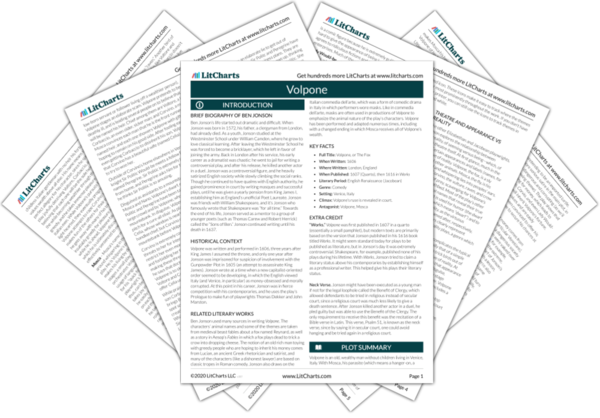At first glance, disease might appear only to be used as a tool for trickery and humor in the play. Volpone’s main scam is pretending that he is rife with disease in order to get money out of hopeful heirs to his fortune. In another scam, this time pretending to be a mountebank, Volpone mentions an excessive list of diseases in an absurd sales pitch for a miraculous healing elixir. In both of these scams, any mention of disease is theatrical and comedic. At the same time, however, for contemporary audiences (and for the characters in the play) disease represents a serious, deadly, and mysterious threat. As mentioned at one point by Sir Politic Would-be, Europe was rife with plague, about which little was understood. And while illness was terrifying and dangerous, contemporary doctors offered little comfort. Characters in the play commonly express their utter distrust of doctors, whom they believe kill patients at will, and characters seek and believe in alternative forms of medicine even beyond cure-all elixirs. Corvino, for example, agrees to let his wife Celia sleep with Volpone as a cure for his ailments. We can also note that despite Volpone’s willingness to evoke disease for trickery, he is constantly afraid that acting sick, dwelling on fears, or experiencing displeasure will result in him truly becoming infected. Medicine and disease, then, are often referenced humorously, but they represent deep and legitimate fears for most of the play’s characters and for its 17th century audience.
Disease and Medicine Quotes in Volpone
Mosca: This is true physic, this your sacred medicine;
No talk of opiates to this great elixir!
Corbaccio: ‘Tis aurum palpabile, if not potabile.
The weeping of an heir should still be laughter
Under a visor.
I rather pity their folly and indiscretion, than their loss of time and money; for those may be recover'd by industry: but to be a fool born, is a disease incurable.
Why, the whole world is but as an empire, that empire as a province, that province as a bank, that bank as a private purse to the purchase of it.
Before I feign'd diseases, now I have one.
I have a little studied physic; but now
I'm all for music, save, i' the forenoons,
An hour or two for painting. I would have
A lady, indeed, to have all letters and art,
Be able to discourse, to write, to paint,
But principal, as Plato holds, your music,
And so does wise Pythagoras, I take it,
Is your true rapture: when there is concent
In face, in voice, and clothes: and is, indeed,
Our sex's chiefest ornament.
To make a snare for mine own neck! and run
My head into it, wilfully! with laughter!
When I had newly scap'd, was free and clear
Out of mere wantonness! O, the dull devil
Was in this brain of mine when I devis'd it,
And Mosca gave it second; he must now
Help to sear up this vein, or we bleed dead.












